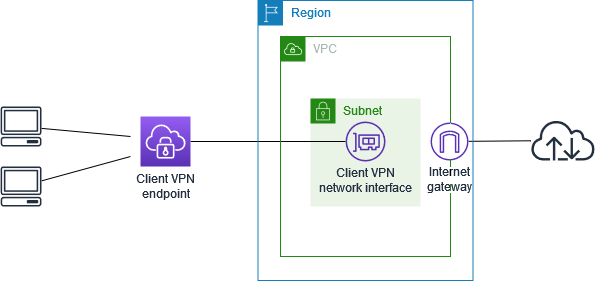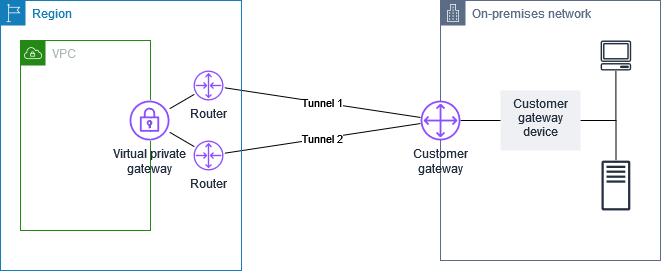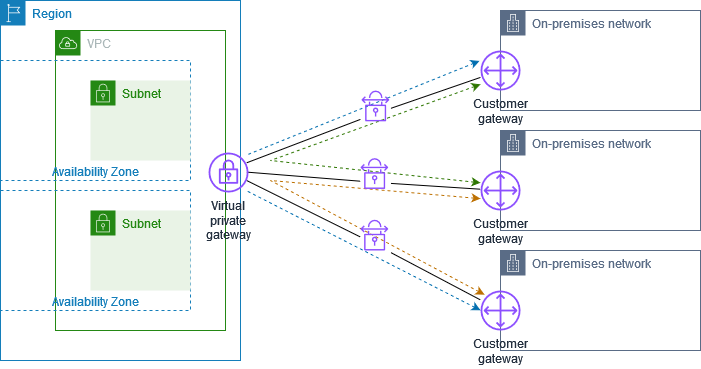
Our Blog Cloud Infrastructure
AWS VPN Options Explained

Written by: Steven Brown
March 29, 2025
AWS VPN Options: What They Are, How They're Different, and When to Use Them
If you're using AWS to host your applications or data, connecting your business network securely is an important step. A VPN, or Virtual Private Network, lets you create a secure connection between your business and your AWS environment. AWS provides a few different VPN solutions, each designed for different needs. Understanding these options will help you choose the best setup for your organization.
What Is a VPN?
A VPN (Virtual Private Network) allows you to send data securely over the internet by creating an encrypted tunnel between two networks. Think of it like a private, guarded pathway through a public road. When your data travels through this tunnel, it's scrambled (or encrypted) so that even if someone intercepts it, they can't read or tamper with the information. This makes VPNs essential for maintaining the confidentiality and integrity of your data.
Without a VPN, data sent over the internet is more vulnerable to threats like interception, spying, or unauthorized access. VPNs help prevent that by ensuring that your communications are shielded from potential attackers. They also allow you to safely access your internal business resources — such as file servers, databases, or web applications — from anywhere.
Here's a simplified look at how it works:
-
Your device (or network) initiates a connection to a VPN server.
-
A secure handshake is performed to establish trust.
-
An encrypted tunnel is created, making sure all traffic between you and the destination is hidden from outsiders.
-
The data travels safely through this tunnel to its target — whether that's an AWS cloud environment, another office location, or a remote server.
In the AWS world, VPNs are commonly used to connect your business network to a Virtual Private Cloud (VPC) — your isolated environment inside AWS where your applications and data live. This allows your on-premises systems and cloud infrastructure to work together as one secure network. VPNs help ensure that this connection is not only secure and encrypted, but also authenticated and restricted to approved devices or users.
AWS Client VPN
AWS Client VPN is designed for individual users, such as remote employees, who need secure access to internal systems hosted on AWS or in your office network. Instead of connecting entire networks, Client VPN provides access on a per-user basis through a downloadable VPN client.

This service is fully managed by AWS, meaning you don't need to maintain any VPN servers. It supports thousands of users and can automatically scale as your team grows. Authentication can be integrated with existing user directories like Microsoft Active Directory, making it easier to manage who gets access. If your business has remote workers or contractors who need secure access to internal resources, Client VPN is a solid choice.
Pros:
- Fully managed service: AWS handles the underlying infrastructure, so you don't need to worry about setting up, patching, or maintaining VPN servers.
- Scalable for remote teams: The service can handle thousands of simultaneous connections, which is great for businesses with a growing or distributed workforce.
- Flexible user authentication: You can integrate with AWS Directory Service or other identity providers, allowing you to control access based on user roles or groups.
Cons:
- Can be more expensive: Pricing is based on the number of active connections and endpoint hours, which can add up for large teams compared to a fixed-cost solution.
- Requires client software: Users must install and configure VPN client software on their devices, which may require additional IT support, especially for non-technical employees.
AWS Site-to-Site VPN
The AWS Site-to-Site VPN connects your business network (like your office or data center) directly to your AWS VPC using the public internet. It uses encryption to ensure that your data is protected while in transit. This type of VPN is ideal if you have on-premises systems that need to talk to your cloud applications or databases.

Site-to-Site VPN consists of two main parts: the Virtual Private Gateway (on AWS's side) and the Customer Gateway (on your side). The Customer Gateway is a device or software application that you own or manage on your local network. It must support IPsec VPN protocols and be configured to connect securely with AWS.
When you set up a Site-to-Site VPN, you'll also create a Customer Gateway resource in AWS, which includes your device's public IP address and routing settings. This tells AWS where to connect, but it doesn't configure your actual device — that part is up to you or your IT team.
AWS automatically provides two VPN tunnels for each Site-to-Site connection. These tunnels offer redundancy: if one goes down due to a failure or routine maintenance, the other keeps your connection alive. For this reason, it's important to configure your Customer Gateway device to use both tunnels. If only one is configured and it fails, your VPN connection will drop.
If you don't already have compatible hardware, AWS Marketplace offers software VPN appliances that are ready to deploy and designed to work with AWS, making setup easier and more reliable. that are pre-configured and tested for compatibility with AWS, which can help simplify deployment and reduce configuration errors.
Pros:
- Cost-effective setup: You don't need to purchase expensive dedicated network lines. The VPN uses the public internet, which reduces costs significantly compared to options like AWS Direct Connect.
- Quick to deploy: It can be set up relatively fast using AWS Management Console or automation tools like Terraform. This is great for businesses needing immediate connectivity.
- High availability built-in: AWS automatically provides two VPN tunnels for each connection, offering a level of redundancy in case one fails.
Cons:
- Dependent on internet quality: Because it relies on the public internet, the speed and reliability can vary. You may experience latency or dropped packets depending on your ISP and routing.
- Limited throughput: Site-to-Site VPN connections typically max out around 1.25 Gbps, which may not be sufficient for data-heavy workloads or real-time applications.
Accelerated Site-to-Site VPN
For businesses that need more consistent performance from their Site-to-Site VPN, AWS offers an Accelerated Site-to-Site VPN feature. This uses AWS Global Accelerator to route your VPN traffic through the nearest AWS edge location and then across AWS's high-speed global network instead of the unpredictable public internet. The result is improved speed, reduced latency, and better reliability.
This feature is only available for VPN connections attached to a Transit Gateway. It must be enabled during the VPN creation process — it cannot be added later. AWS automatically creates and manages the required accelerators behind the scenes, so you don't need to configure anything extra.
A few limitations apply: acceleration requires NAT traversal, and certificate-based authentication may not work reliably due to packet fragmentation limits in Global Accelerator. If your business handles performance-sensitive traffic or has experienced unreliable internet connectivity, enabling acceleration can make a meaningful difference.
AWS VPN CloudHub
VPN CloudHub is used to connect multiple office locations or branch networks to each other through AWS. It builds on Site-to-Site VPN by creating a hub-and-spoke network design, where each location connects to AWS and can communicate with other connected locations through the cloud.

This is especially useful for businesses with more than one office that want to centralize their networking without the complexity of setting up private circuits. While it still relies on public internet connections, it provides a secure and manageable way to connect remote locations to each other and to AWS.
Pros:
- Centralized network design: VPN CloudHub lets you use AWS as the central point for your network, simplifying the management and monitoring of inter-office connections.
- Cost-effective alternative to MPLS: You avoid the complexity and cost of traditional WAN solutions like MPLS, while still maintaining private communication between sites.
- Built-in encryption: All communication between branches is encrypted, ensuring security without additional hardware or software.
Cons:
- Internet reliability still applies: Like Site-to-Site VPN, CloudHub depends on the public internet, which can lead to inconsistent performance.
- Manual configuration required: Setting up multiple Site-to-Site VPNs and routing rules between offices can become complex as the number of branches increases.
How These VPNs Compare
Each AWS VPN solution addresses a different business scenario:
- Client VPN is best for remote workers, contractors, or mobile teams. It’s a fully managed solution that offers secure, user-level access without needing to maintain VPN hardware or servers. It scales easily and integrates with identity systems.
- Site-to-Site VPN connects your office network directly to AWS. It’s suited for hybrid environments where systems on-premises need secure access to cloud resources. It includes redundant tunnels for high availability.
- Accelerated Site-to-Site VPN builds on Site-to-Site VPN by routing traffic through the AWS Global Accelerator network. This improves speed, reliability, and consistency — ideal for businesses dealing with high-latency or mission-critical traffic.
- VPN CloudHub enables secure communication between multiple office locations using a hub-and-spoke model. It simplifies network design for businesses with geographically distributed sites.
Understanding these differences ensures you choose the most effective solution for your business needs, without overpaying or over-engineering your network setup.
When to Use Each VPN Option
- Choose Client VPN when your team works remotely or you need to provide secure, individual access to internal resources from anywhere.
- Choose Site-to-Site VPN when you need to securely connect your office or data center to AWS for hybrid workloads.
- Choose Accelerated Site-to-Site VPN when consistent performance, lower latency, or internet reliability is a concern — especially if you're already using a transit gateway.
- Choose VPN CloudHub when you operate multiple branch offices and want to centralize communication securely through AWS.
You can also combine these options — for example, using Accelerated Site-to-Site VPN for your headquarters and Client VPN for your remote team — to build a flexible and robust network architecture.
Final Thoughts
Choosing the right VPN solution from AWS doesn't have to be complicated. The key is to match your needs to the type of VPN AWS offers. Whether you're connecting a single office, supporting remote workers, or managing multiple locations, there's an AWS VPN option that fits.
At Bliztek, we specialize in building secure, scalable cloud solutions tailored to how your business operates. If you're unsure which VPN setup is right for you, we can help guide you through it and even take care of the setup for you. Reach out today to learn more about how we can simplify your cloud journey.

Steven Brown
Software Engineer
I am a Software Engineer based in the United States, passionate about writing code and developing applications. My journey into tech followed a unique path, beginning with a 9-year enlistment as a Russian Cryptologic Linguist in the US Army. This experience has fueled my unwavering commitment to excel in all aspects of software engineering.





